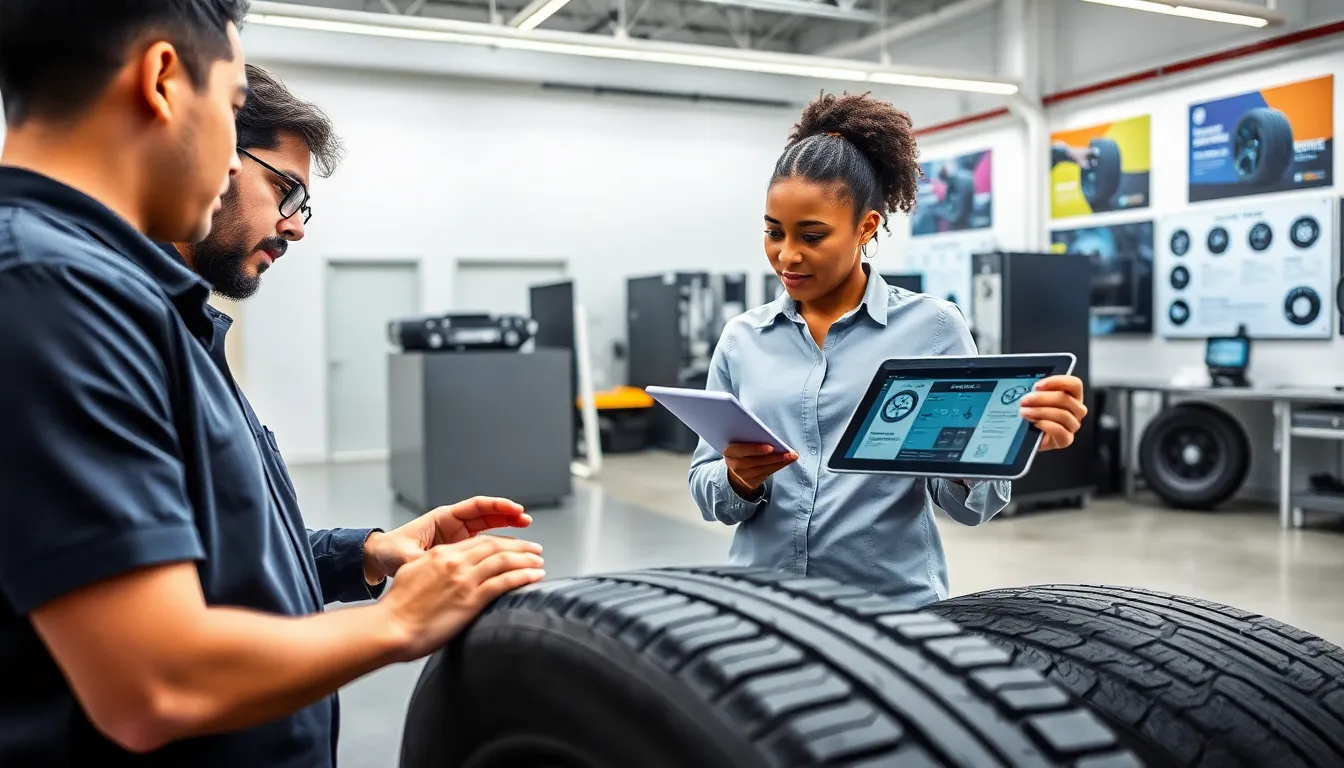Buying tires for electric vehicles is like finding a vegan cheeseburger at a barbecue: it’s essential but not always easy. Electric vehicles (EVs) are all the rage these days, but with great eco-friendliness comes specific tire needs. If you’re ready to roll with your electric dream car, understanding the right tires is key. So, buckle up, and let’s explore why choosing the right tires for EVs can mean the difference between a smooth ride and a bumpy one.
Table of Contents
ToggleUnderstanding The Unique Needs Of Electric Vehicles

When it comes to electric vehicles, the tire game changes dramatically. EVs come packed with hefty batteries, which means they often weigh significantly more than traditional cars. This added weight can cause standard tires to wear out faster and struggle to deliver optimum performance. Also, electric motors generate instant torque, which can lead to rapid acceleration. Tires designed for this unique driving style need to have superior grip and durability.
Besides, the unique design and weight distribution of EVs require special attention to rolling resistance. Lower rolling resistance means better efficiency, so tire manufacturers have been hard at work creating options that not only provide stellar performance but also help maximize that precious battery life.
In essence, EV drivers aren’t just looking for tires that fit: they need tires that complement the whole electric driving experience.
Types Of Tires Suitable For Electric Vehicles
Choosing the right type of tire for an electric vehicle isn’t merely a matter of aesthetics or brand loyalty. It revolves more around functionality. Here are some common types that stand out:
- All-Season Tires: These are the versatile champs of tire types. They’re designed to handle a little bit of everything from mild winter conditions to summer heat. For typical EV users who seek a year-round solution, all-season tires can be a solid choice.
- Eco-Friendly Tires: Crafted specifically for electric vehicles, these tires often feature materials that reduce rolling resistance. They deliver exceptional energy efficiency, which translates to improved range.
- Performance Tires: For those who crave speed and responsiveness, performance tires are essential. They provide enhanced traction and stability, ideal for electric cars that appreciate aggressive driving.
- Winter Tires: If you live in an area that turns into a winter wonderland, winter tires designed for EVs can ensure safety and stability in snow and ice. They help maintain grip even when the temperature dips low.
Each type has its advantages and is suited for different driving styles, climates, and personal preferences.
Benefits Of Specialized Tires For EVs
Specialized tires for electric vehicles offer a variety of benefits that extend beyond just performance. Here’s a closer look:
- Increased Range: Tires with low rolling resistance can help conserve battery life. This means an electric vehicle can travel further on a single charge, which is nothing short of a game-changer for daily commutes or long road trips.
- Enhanced Safety: Specialized tires often provide improved traction and handling, essential for the instant torque delivered by electric motors. This translates into a secure driving experience, especially in adverse weather conditions.
- Quieter Rides: EVs are already known for their silent operations, and pairing them with the right tires can amplify this aspect. Specialized tires tend to be designed for reduced road noise, giving drivers a tranquil drive.
- Longevity: Many specialized tires are constructed with durable materials, engineered to withstand the demands of electric vehicles. This can lead to fewer replacements and eventually reduced long-term costs.
Factors To Consider When Choosing Tires For EVs
Choosing the perfect tires for an electric vehicle is no small feat. A few critical factors are essential in making an well-informed choice:
- Weight Load Rating: Make sure the tires can handle the added weight of the battery in an EV. Underestimating this can lead to catastrophic failures.
- Rolling Resistance: Look for tires that optimize rolling resistance to ensure that driving range isn’t adversely affected.
- Tread Design: The design significantly influences traction and handling, especially in wet conditions. A balanced tread can offer the right mix for normal use and performance driving.
- Warranty and Lifespan: Tire warranties can vary. Consider long-term costs and the average lifespan when comparing options.
Maintaining Your EV Tires
Maintenance is vital for ensuring the longevity and performance of tires for electric vehicles. A few simple practices can keep them in top shape:
- Check Tire Pressure Regularly: Improper inflation can lead to inefficient performance and increased wear. Check weekly to ensure they are within the manufacturer’s recommended range.
- Rotate Tires: Just like traditional vehicles, tires on EVs need rotation to ensure even wear. This practice can extend their life and improve performance.
- Keep Them Clean: Regular washing can help clear away debris that could damage tires or hinder performance.
- Inspect for Damage: Monthly inspections can help catch problems early. Look for wear patterns, cuts, or bulges, and consult with a professional if anything looks suspicious.
Future Trends In EV Tires
As electric vehicles continue to gain traction, the future of tires for EVs is looking smart and innovative. Here are a few trends worth keeping an eye on:
- Smart Tires: Technology is advancing, and smart tires equipped with sensors can communicate with the vehicle. They can assess tread wear, tire pressure, and temperature to provide real-time data for optimal driving conditions.
- Eco-Friendly Materials: With growing environmental awareness, tire manufacturers are investing in sustainable materials that minimize ecological impact while maximizing performance.
- Advanced Tread Designs: We can expect to see innovations in tread designs that adapt to different conditions, improving traction whether on rain-soaked roads or snowy paths.
- Self-Healing Tires: Fantasy might soon meet reality with self-repairing materials that can close minor punctures automatically, enhancing safety and longevity.






